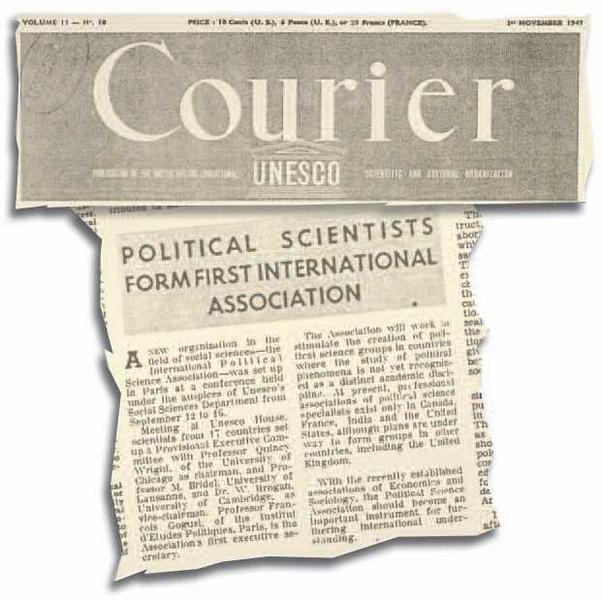IPSA's 70th Anniversary

70 years after its foundation, the International Political Science Association (IPSA) will celebrate its anniversary at its founding location in Paris, in collaboration with the French Political Science Association. The event will bring together IPSA presidents, past and current Executive Committee members, national associations, Research Committees, scholars and students.
As a 70th anniversary celebration, an academic conference will be held at Sorbonne University. Michelle Bachelet, United Nations High Commissioner for Human Rights, will be deliver the keynote speech. Prominent scholars will discuss pertinent issues for our discipline: Roundtables will focus on Political Science in Turbulent Times: 1949 – 2019 and Preserving Academic Freedom in the Face of Democratic Erosion. Moreover, the event will feature the book launch of Political Science and Digitalization - Global Perspectives, an edited volume by Marianne Kneuer, current IPSA President, and Helen Milner, former IPSA President, which gathers selected articles from IPSA’s Hannover Conference in 2017. View detailed program here.
9:00 - 10:00 Welcome Address
- Marianne Kneuer, President of IPSA
- La Sorbonne - Georges Haddad, President of Université Paris 1 Panthéon-Sorbonne
- UNESCO - John Crowley, Chief of Section for Research, Policy and Foresight in the UNESCO Sector for Social and Human Sciences
- Honouring the four founding countries - Canada, France, India, USA
10:00 - 11:00 Keynote Speech
Michelle Bachelet, United Nations High Commissioner for Human Rights and Former President of Chile
11:15 - 12:45 Roundtable 1 - Political Science in Turbulent Times: 1949-2019
Chaired by Dianne Pinderhughes, Professor in the Departments of Africana Studies and Political Science at the University of Notre Dame - United States
- John Crowley, Chief of Section for Research, Policy and Foresight in the UNESCO Sector for Social and Human Sciences - France
- Bruce W. Jentleson, William Preston Few Professor of Public Policy and Professor of Political Science at Duke University Sanford School of Public Policy - United States
- Nonna Mayer, Centre for European Studies and Comparative Politics of Sciences Po (CEE) and French National Centre for Scientific Research (CNRS) Emeritus Research Director - France
- Lourdes Sola, Professor of the Department of Political Science and Center for Public Policy Research at the Universidade of São Paulo and IPSA Past President - Brazil
14:30 - 16:00 Roundtable 2 - Preserving Academic Freedom in the Face of Democratic Erosion
Chaired by Ilter Turan IPSA Past President, Emeritus Professor of Political Science at Istanbul Bilgi University - Turkey
- Kris Deschouwer, Chair of European Consortium of Political Research - Belgium
- Kristian Gleditsch, Regius Professor of Political Science at University of Essex, Chair of the Committee on Academic Freedom at International Studies Association - United Kingdom
- Katrin Kinzelbach, Professor of International Politics of Human Rights at Friedrich-Alexander-Universität Erlangen-Nürnberg - Germany
- Robert Quinn, Executive Director of the Scholars at Risk Network - United States
- Rogers Smith, Christopher H. Browne Distinguished Professor of Political Science and APSA Past President - United States
16:15 - 17:00 Book Launch - Political Science and Digitalization - Global Perspectives
Presented by Thierry Vedel, Center for Political Research at Sciences Po (CEVIPOF) and French National Centre for Scientific Research (CNRS) Senior Research Fellow - France
With Editors:
- Marianne Kneuer, IPSA President and Professor of Political Science at the University of Hildesheim - Germany
- Helen Milner, IPSA Past President and B.C. Forbes Professor of Politics and International Affairs at Princeton University - United States
Foundation of IPSA
IPSA was founded in September 1949, when representatives from sixteen countries gathered at UNESCO House in Paris. That inaugural meeting was led by delegations from the national associations of IPSA’s four founding countries: the United States, Canada, India, and France. In late 1949, the first Executive Committee and Executive Secretary begun to put into place the structures that would enable IPSA to take up the challenge laid out in its constitution: "[promoting] the advancement of political science throughout the world."
The first article about the creation of IPSA, published in the UNESCO Courier in November 1949.

IPSA's First Logo

IPSA Letterhead used in the 1980's
Since its first World Congress of Political Science in Zürich in 1950, IPSA has organized 25 successful World Congresses and numerous conferences across the world and more than 25,000 people attended these international events.
Today, IPSA publications, International Political Science Review and International Political Science Abstracts, as well as the IPSA Portal, seek to meet the needs of political scientists in different parts of the world. IPSA also organizes various Summer Schools for students and young researchers in collaboration with prominent universities and offers free IPSAMOOC - Massive Open Online Course - on its website.
We are proud that IPSA has successfully accomplished its mission of creating a global, inclusive political science community, which today counts 58 national associations, over 90 institutional members, and more than 3,000 individual members.
PARTNERS





